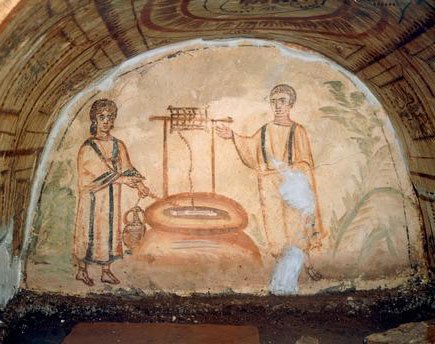Click here to watch a video of this service on our YouTube channel. (Live stream will be at 7pm on May 13th, 2020)
Decree on Dispensation

Dear Parishioners & Friends of St. Stephen,
Thanks be to God, beginning Monday, May 18th, our liturgical celebrations will once again be open to the public. The dispensation from the obligation to attend Liturgy (either Vespers, Matins, or Divine Liturgy) for Sundays and Great Feasts remains in effect until further notice. No one is dispensed from prayer on the Lord’s Day, of course. Keep praying! If it has been more than a month since your last confession, make sure to go to confession before receiving holy communion. This, along with fasting and prayer, is a necessary step in preparing to receive holy communion. I am available for confession at the times listed in the bulletin and also by appointment.
Though we will once again be celebrating together, this will not be “back to normal.” Bishop Milan has given us many guidelines to follow when we reopen:
- Before each service, the church should be cleaned and sanitized – especially areas that are commonly touched (railings, doors, backs of pews, etc.) If anyone would like to volunteer to come early and assist with this and/or donate cleaning supplies, please let me know.
- I am to remove all the Holy Water containers and fountains. I will provide anyone with a container of holy water for their own use by request.
- I am to remove all the pew books and put them away. If you have your own pew book, feel free to bring it from home and take it back home with you. If you would like your own pew book, let me know and I’ll supply you with one.
- To assist with increasing ventilation and reducing frequently touched surfaces, the doors from the narthex into the nave will be kept open at all times.
- Every other pew will be blocked off with ribbon and spaces where people should sit in the pews will be marked. In the aisle is a single file row of marks 6 feet apart where you should stand as you approach to receive Holy Communion.
- You may sit close to the members of your own household, but keep 6 feet of distance away from others.
- You may venerate the icons, etc. by bowing rather than by kissing.
- All other types of gatherings, such as our coffee social, ECF, and adult classes remain cancelled.
- If you feel ill or have a fever, please stay at home. Even in ordinary times, there is no “obligation” to come to church while you are ill.
- If you have prepared to receive communion, when you approach, tilt your head back, open your mouth wide, do not say anything, and do not close your mouth upon the spoon. The spoon will be sanitized when needed by wiping it with a cloth soaked in pure alcohol. I will pray the prayer mentally, rather than out loud, as I give you communion.
- The ushers will not take up the collection, but baskets will be placed near the entrance where you can leave your offering. Please remember to support St. Stephen financially at this time.
- Celebration of baptisms, weddings, and funerals are allowed if all precautions listed above are observed.
- To help with keeping physical distance between people, please consider alternately attending Vespers or Matins or Divine Liturgy, rather than only the Divine Liturgy. Even in ordinary times, any of these three services fulfills your Sunday obligation.
- If you do not feel safe, remember that there is no obligation to attend church at this time. Rather, keep the day holy with prayer at home.
- Live streams of our liturgical services will continue.
God be with you all and I so look forward to seeing those of you who come!
In Christ,
Fr. John
First & Third Hour & Divine Liturgy for the Leave-taking of Mid-Pentecost
Click here to watch a video of this service on YouTube (live stream begins at 9am, Wednesday, May 13th, 2020)
FIRST HOUR PROPERS for Mid-Pentecost
Midpentecost Third Hour Propers
First & Third Hour for the 5th Tuesday of Pascha – Postfestive day of Mid-Pentecost
Click here to watch a video of this service on YouTube (live stream begins at 9am, Tuesday, May 12th, 2020)
Out of the Darkness and into the Light
Jesus shines his light into the life of the Samaritan woman (John 4:5-42).
He comes to the well of their mutual father Jacob in the middle of the day – at the sixth hour, that is, at the height of noon – when the sun is at its highest in the sky and the day is at its hottest and brightest point. Given these conditions, it’s no wonder that Jesus was weary at this time and that he sat down beside the well to rest (John 4:6).

One of the oldest images from the Christian tradition
That’s no wonder, but here is a wonder: a woman comes to draw water from the well at the sixth hour. A sane woman would come to the well early in the morning, during the cool of the day, to draw the day’s water. These are desert conditions, don’t forget. Many have suggested that this Samaritan woman chooses this time to come to the well, in all this heat and brightness, because of a darkness in her life. That is, she comes at noon because no one else comes at noon. We can understand that a woman who had gone through five husbands and was now living with a man not her husband was perhaps outcast among the women of her community. We don’t really know this, but it may be that a woman so popular with the men was rather unpopular with the women. And so she wants to avoid them. Small wonder. That’s understandable.
To escape the judgments, criticisms, and harassment of the other women, she comes to the well at the least popular time, when it’s at its hottest and brightest and most physically uncomfortable. Better to be physically uncomfortable than to endure the judgmental looks of others – you know that’s true. Better the staring eye of the noonday sun than the scornful eye of an enemy.
So to keep herself in the dark, she comes to the well in the light and finds sitting there by the well the one who is light himself, weary from his journey and asking her for water.
They speak of water and eternal life, of Samaritans and Jews, and of worship. Jesus reveals to her the true worship, which is worship in spirit and truth. And he tells her everything she’d ever done, as she puts it (John 4:39). He shines his light into her life.
Trying to hide, she finds herself exposed – but not exposed by her judgmental rivals – rather, exposed to the light by her merciful and loving Lord.
Sin festers in the dark and dies in the light. We are healed from sin, which is really a disease, by exposing in to the light. This is why confession is a sacrament of healing. When we sin, it’s as though we’ve been bitten by a poisonous creature and our choice is to leave the poison in the wound to do its work killing us or to draw the poison out into the light where it can do us no harm.
Truly, Jesus is the physician of our souls and bodies. And today, he heals the Samaritan woman by drawing the poison of her secret sin out into the light. She doesn’t quite confess it, though what she says is true when she says, ‘I have no husband” (4:17). Nonetheless, when Jesus exposes the true meaning of her words to her she recognizes and admits the truth of them by confessing that Jesus is a prophet (4:19), that is, that his words of the words of God and are the truth.
Hearing all that Jesus says and recognizing that he speaks the word of God, she leaves behind her water jar and hastens back to the very community she had been avoiding to tell them all that the long-expected Christ is sitting by their father’s well. How can she, an outcast, go among those who have despised her to preach to them the gospel? But that is what she does. Like the apostles who leave their nets when they are called by Jesus, she leaves behind her water jar to go and preach the gospel to the whole city.[i] She is called by our tradition equal-to-the-apostles.
She is no longer afraid of what other people think of her. Christ frees her from her fear of others’ judgment. I’m quite sure he doesn’t free her from others’ judgment. When this outcast woman of poor reputation comes into the city proclaiming that she has encountered the Christ, I’m sure she received more than one stink eye and suspicious glare. “Why should we trust a woman like you?” I expect many thought or even said. But she is freed from her fear of that judgment. She leaves that fear behind with her water jar at the well, because she has been freed from the darkness in her life by the light of the world, and no worldly power can stop the power of her God-given conviction. And so through her, many come to believe. She brings many into the light – to Christ – because Jesus is the light. She is like the first evangelist, bringing people to Christ even before he dies and rises from the dead.
By tradition, we know that she was baptized and brought her five sisters and her two sons into the faith and they all continued to evangelize. After the martyrdom of Peter and Paul, she and her family traveled to Carthage to preach the gospel there until they too were martyred.
And we also know the name she received in her baptism: Photini, the enlightened one, for she received the light of Christ and let it shine before all with neither fear nor shame again until the end of her life.
In some ways, Photini is the quintessential baptismal name. Some of the fathers of the Church regarded all the mysteries of initiation into the Church and into the body of Christ – baptism, chrismation, and eucharist – to be a single mystery, which they name illumination or enlightenment. The one thus received is therefore Photini and Photini becomes for us all an image of our baptism. Like Photini, we are all subject to death in our sins when Christ encounters us at the well, or at the font of our baptism, through which he shines his light into our darkness and illumines us. May we all, like Photini, having been filled with grace through the holy mysteries, live out our whole lives with evangelical fervor. Like her, let us proclaim to everyone we meet without fear of what they might think of us, the good news of Christ’s coming into the world and saving us from sin and death by his death and resurrection.
Christ is risen!
[i] Chrysostom: As the apostles left their nets on being called, so she leaves her water jar to do the work of an evangelist by calling not one or two people, as Andrew and Philip did, but a whole city. (Homilies on the Gospel of John 34.1).
- « Previous Page
- 1
- …
- 156
- 157
- 158
- 159
- 160
- …
- 190
- Next Page »
